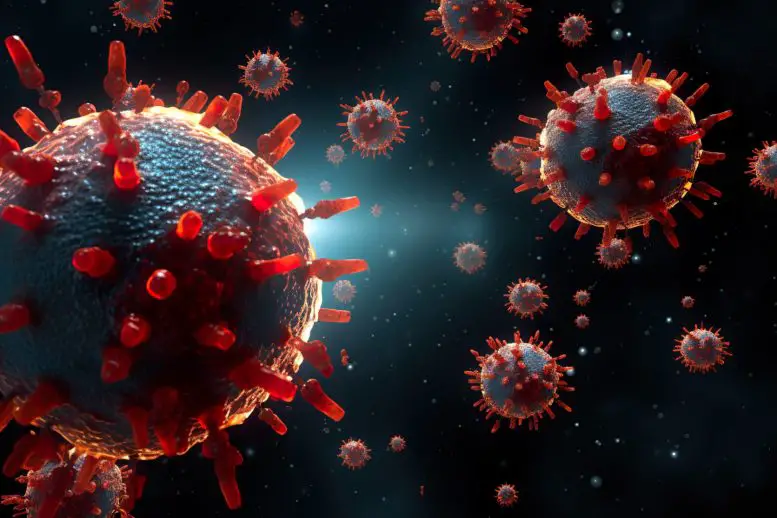
Bilim adamları, T hücreleri için, kanseri ve çeşitli hastalıkları tedavi etmek için son derece özelleştirilebilir CAR T hücresi ve diğer immünoterapilere yol açabilecek evrensel bir reseptör sistemi geliştirdiler. Yeni yaklaşım, farklı proteinleri hedef alan antikorlarla kaynaşabilen evrensel bir “SNAPtag” içeren reseptörlere sahip T hücrelerini tasarlamayı içerir. Bu, tedavilerin optimal bağışıklık tepkileri için uyarlanmasına izin verir. Araştırmacılar, CAR ve SynNotch reseptörlerinde SNAP yaklaşımlarının potansiyelini göstererek, kanser, otoimmün bozukluklar ve organ nakli toleransında özelleştirilmiş tedaviler için olanaklar açtı.
Pittsburgh Üniversitesi’ndeki araştırmacılar, T hücreleri için, kanser ve diğer hastalıklara yönelik CAR T hücresi ve diğer immünoterapilerde devrim yaratabilecek evrensel bir reseptör sistemi yarattılar. Yenilikçi “SNAPtag” tekniği, çeşitli proteinleri hedefleyen antikorlarla kaynaştırarak özel tedavilere olanak tanır.
Pittsburgh Üniversitesi araştırmacıları, T hücrelerinin herhangi bir hücre yüzeyi hedefini tanımasına izin veren, kanser ve diğer hastalıkları tedavi etmek için son derece özelleştirilebilir CAR T hücresi ve diğer immünoterapileri mümkün kılan evrensel bir reseptör sistemi geliştirdi. Keşif, katı tümörlere kadar uzanabilir ve daha fazla hastanın, CAR T hücre tedavisinin belirli kan kanserlerinde ürettiği oyunun kurallarını değiştiren sonuçlara erişmesini sağlayabilir.
Dergide bugün (9 Mayıs) yayınlanan bir çalışmada açıklandığı gibi
CAR T cell immunotherapy involves engineering a patient’s own cells so that the T cell receptor recognizes a specific protein on cancer cells before infusing them back into the patient.
“One of the big problems with CAR T therapy is that you’re targeting just one protein,” explained Lohmueller. “If the tumor evolves to lose that protein or downregulate it, you need to re-engineer the T cells a second time, which is a highly involved and expensive process.”
To overcome this problem, Lohmueller, first author Elisa Ruffo, Ph.D., postdoctoral associate at Pitt, Alexander Deiters, Ph.D., professor of chemistry at Pitt and their colleagues developed universal SNAP-CAR T cells by adding a SNAPtag enzyme to the CAR receptor. These cells are administered along with cancer-targeting antibodies that are labeled with a molecule called benzylguanine.
Via a bio-orthogonal chemistry — a type of reaction that occurs in living systems without interfering with natural processes — the SNAPtag reacts with benzylguanine, fusing the antibody to the receptor. Adding different antibodies, at the same time or one after another, allows the receptor to recognize different tumor features.
“What’s unique about our approach is how the T cell interacts with the antibody. It’s not just binding, but fusing via covalent attachment — the strongest form of chemical bond,” explained Lohmueller. “This type of bio-orthogonal approach has been shown to work in animals for imaging purposes, but we’re among the first to use it therapeutically, so we’re really pushing the boundaries of covalent technology.”
An advantage of this tight bond means that activation of the receptor can be achieved with lower doses of antibody, said Lohmueller. Using mathematical modeling, graduate student Adam Butchy and Natasa Miskov-Zivanov, Ph.D., assistant professor of electrical and computer engineering at Pitt’s Swanson School of Engineering, showed that it may also be possible to get activity from weaker interactions between antibodies and tumor cells, giving greater flexibility to the types of cancer proteins that can be targeted.
The covalent bond was also the secret ingredient for creating SNAP-SynNotch cells. When a SynNotch receptor is activated, mechanical pulling forces stretch the receptor to expose part of the protein, which is then cut to release a transcription factor that travels to the cell’s nucleus to turn on expression of a chosen gene.
“We found that we needed the strength of a covalent bond to tolerate that pulling force,” explained Lohmueller. “If we just had binding between receptor and antibody, the receptor would come apart and we wouldn’t get signaling.”
The researchers showed that their universal SNAP-CAR and SNAP-SynNotch receptors could be activated in response to different targets by adding the corresponding antibodies. SNAP-CAR T cells were also able to simultaneously target multiple proteins on different types of cells, suggesting that they could help avoid cancer relapse due to variation in tumor targets or loss of those targets.
In a mouse model of cancer, treatment with SNAP-CAR T cells shrunk tumors and greatly prolonged survival, an important proof-of-concept that sets the stage to test this approach in clinical trials in partnership with Coeptis Therapeutics, which has licensed the SNAP-CAR technology from Pitt.
Reference: “Post-translational covalent assembly of CAR and synNotch receptors for programmable antigen targeting” 9 May 2023, Nature Communications.
DOI: 10.1038/s41467-023-37863-5
Other authors on the study were Yaniv Tivon, Victor So, Michael Kvorjak, Avani Parikh, M.S., Eric L. Adams, M.D., and Olivera J. Finn, Ph.D., all of Pitt or UPMC.
This work was supported by the National Institutes of Health (R01 GM142007, R35 CA210039, R21 AI130815, 1S10OD011925-01 and P3 0CA047904), the Defense Advanced Research Projects Agency (W911NF-17-1-0135), the Italian Foundation for Cancer Research (22321), and the Michael G Wells Prize.












